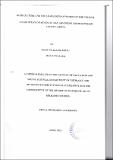| dc.description.abstract | ABSTRACT
TITLE: GUSII CULTURE AND THE LEADERSHIP OF WOMEN IN THE CHURCH.A CASE STUDY ON SEVEN SEVENTH DAY ADVENTIST CHURCH IN KISII COUNTY -KENYA
AUTHOR: MARY NYARANGI OSITU
This study was conducted to find out the impact of Gusii culture on the leadership of women in the seventh Day Adventist Church (SDA) in Kisii County, Kenya. The objectives of the study were: To find out the Gusii cultural perceptions that work against the choosing of women leaders in the SDA church, to establish how Gusii culture influences the leadership of women in the church, to establish the role of women in the SDA church leadership and to come up with recommendations on how the issue of women leadership can be addressed in the SDA church. The study focused on the 645 SDA churches in the County, with a total population of 150,221 members. The theoretical framework of the study was based on the social construction theory of Kenneth J. Gergen and the feminist post-structural theory of Chris Weedon. Simple random sampling was used to get the sample size for the study. Questionnaires and oral interviews were used to collect data from church elders, women in leadership and women not in leadership. Interview schedules were used -to collect data from the pastors. Content validity was ascertained using experts and pilot study whereas reliability was established using split-half technique. The research design used in the study was survey correlation. This was chosen because a lot of information from widely scattered respondents was obtained and analyzed. The design also provided information concerning the degree of relationship between the variables under study through correlation coefficient matrices. Data analysis was done using qualitative techniques (SPSS). It was presented by the use of simple descriptive statistics like tables, frequencies and percentage as well as narratives and thematic quotations. The study was significant because it provided understanding of the impact of culture on the leadership of women in the SDA church. It also provided a useful forum through which women in the church expressed their views on the issue of leadership. The findings of the study: There are Gusii cultural perceptions that affect the leadership of women in the SDA church; Gusii culture has an impact on the leadership of women in the SDA church; Women play subordinate roles in the SDA church leadership; There are very few ordained female pastors in the SD~ church in Kisii county; Women need empowerment in order to access leadership positions in the SDA church. The study recommended that women be integrated in church leadership. This can be done through theological training, empowerment of women, taking them through mentorship programs and exposing them to leadership. The study also recommended that further research be done on past beliefs and writings about women issues from women's perspective. Finally, the study recommended that research be done on the impact of Gusii culture on women leadership in other Christian churches in the area. | en_US |

